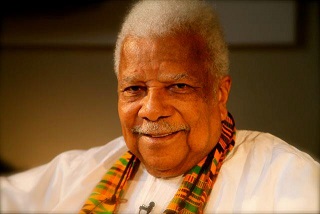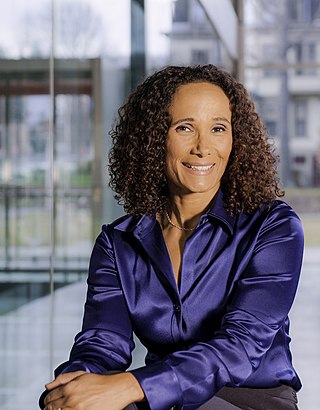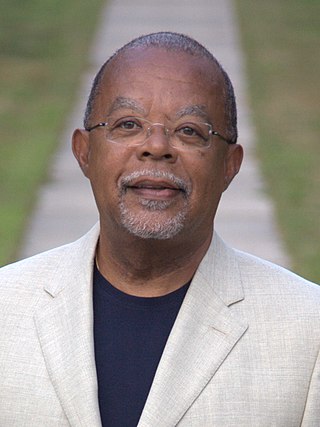William Julius Wilson is an American sociologist, a professor at Harvard University, and an author of works on urban sociology, race, and class issues. Laureate of the National Medal of Science, he served as the 80th President of the American Sociological Association, was a member of numerous national boards and commissions. He identified the importance of neighborhood effects and demonstrated how limited employment opportunities and weakened institutional resources exacerbated poverty within American inner-city neighborhoods.

Penn Museum, formally known as The University of Pennsylvania Museum of Archaeology and Anthropology, is an archaeology and anthropology museum at the University of Pennsylvania. It is located on Penn's campus in the University City neighborhood of Philadelphia, at the intersection of 33rd and South Streets. Housing over 1.3 million artifacts, the museum features one of the most comprehensive collections of Middle and Near-Eastern art in the world.

Black studies or Africana studies, is an interdisciplinary academic field that primarily focuses on the study of the history, culture, and politics of the peoples of the African diaspora and Africa. The field includes scholars of African-American, Afro-Canadian, Afro-Caribbean, Afro-Latino, Afro-European, Afro-Asian, African Australian, and African literature, history, politics, and religion as well as those from disciplines, such as sociology, anthropology, cultural studies, psychology, education, and many other disciplines within the humanities and social sciences. The field also uses various types of research methods.
Ed Guerrero is an American film historian and associate professor of cinema studies and Africana studies in the Department of Social and Cultural Analysis at New York University Tisch School of the Arts. His writings explore black cinema, culture, and critical discourse. He has written extensively on black cinema, its movies, politics and culture for anthologies and journals such as Sight & Sound, FilmQuarterly, Cineaste, Journal of Popular Film & Television, and Discourse. Guerrero has served on editorial and professional boards including The Library of Congress' National Film Preservation Board.

Ali Al'amin Mazrui, was a Kenyan-born American academic, professor, and political writer on African and Islamic studies, and North-South relations. He was born in Mombasa, Kenya. His positions included Director of the Institute of Global Cultural Studies at Binghamton University in Binghamton, New York, and Director of the Center for Afro-American and African Studies at the University of Michigan. He produced the 1980s television documentary series The Africans: A Triple Heritage.

Gwendolyn Audrey Foster is an experimental filmmaker, artist and author. She is Willa Cather Professor Emerita in Film Studies. Her work has focused on gender, race, ecofeminism, queer sexuality, eco-theory, and class studies. From 1999 through the end of 2014, she was co-editor along with Wheeler Winston Dixon of the Quarterly Review of Film and Video. In 2016, she was named Willa Cather Endowed Professor of English at the University of Nebraska at Lincoln and took early retirement in 2020.
Elijah Anderson is an American sociologist. He is the Sterling Professor of Sociology and of African American Studies at Yale University, where he teaches and directs the Urban Ethnography Project. Anderson is one of the nation’s leading urban ethnographers and cultural theorists. Anderson is known most notably for his book, Code of the Street: Decency, Violence, and the Moral Life of the Inner City (1999).
Renee Tajima-Peña is an American filmmaker whose work focuses on immigrant communities, race, gender and social justice. Her directing and producing credits include the documentaries Who Killed Vincent Chin?, No Más Bebés, My America...or Honk if You Love Buddha, Calavera Highway, Skate Manzanar, Labor Women and the 5-part docuseries Asian Americans.

History Detectives was a documentary television series on PBS. It featured investigations made by members of a small team of researchers to identify and/or authenticate items which may have historical significance or connections to important historical events, and to answer specific questions brought to them about these artifacts. Common subjects were family heirlooms and historical structures. Its stated missions were "exploring the complexities of historical mysteries, searching out the facts, myths and conundrums that connect local folklore, family legends and interesting objects."

Tricia Rose is an American sociologist and author who pioneered scholarship on hip hop. Her studies mainly probe the intersectionality of pop music and gender. Now at Brown University, she is a professor of Africana Studies and is the director of the Systemic Racism Project at the Center for Study of Race and Ethnicity in America. Rose also co-hosts a podcast, The Tight Rope, with Cornel West.

William A. "Sandy" Darity Jr. is an American economist and social scientist at Duke University. Darity's research spans economic history, development economics, economic psychology, and the history of economic thought, but most of his research is devoted to group-based inequality, especially with respect to race and ethnicity. His 2005 paper in the Journal of Economics and Finance established Darity as the "founder of stratification economics." His varied research interests have also included the trans-Atlantic slave trade, African American reparations and the economics of black reparations, and social and economic policies that affect inequities by race and ethnicity. For the latter, he has been described as "perhaps the country’s leading scholar on the economics of racial inequality."
Roy Simon Bryce-Laporte was a sociologist who established one of the first African-American studies departments.
African Independence is a 2013 feature-length documentary film and the directorial debut of sociologist Tukufu Zuberi, who also hosts the film. The film premiered at the San Diego Black Film Festival in January 2013 and in 2015, Zuberi published a companion book through Rowman & Littlefield.
Yaba Blay is a Ghanaian-American professor, scholar-activist, public speaker, cultural worker, and consultant. She is originally from Ghana, West Africa, and was raised in New Orleans, Louisiana, United States. Her scholarship, work, and practice center on the lived experiences of Black women and girls, with a particular focus on identity politics and beauty practices. A social media activist, she has launched several viral campaigns, including Locs of Love, #PrettyPeriod, and #ProfessionalBlackGirl, in her multi-platform digital community.

Peniel E. Joseph is an American scholar, teacher, and public voice on race issues especially the history of the Black power movement. He holds a joint professorship appointment at the LBJ School of Public Affairs and the History Department in at the University of Texas at Austin. Joseph joined UT Austin in 2015 from Tufts University in Massachusetts, where he had founded the school's Center for the Study of Race and Democracy (CSRD). He founded the second Center for the Study of Race and Democracy (CSRD) on the University of Texas campus in 2016, and is director of the center.

Henry Louis Gates Jr. is an American literary critic, professor, historian, and filmmaker who serves as the Alphonse Fletcher University Professor and the director of the Hutchins Center for African and African American Research at Harvard University. He is a trustee of the Gilder Lehrman Institute of American History. He rediscovered the earliest known African-American novels and has published extensively on the recognition of African-American literature as part of the Western canon.
Ann Juanita Morning is an American sociologist and demographer whose research focuses on race. In particular, she has studied racial and ethnic classification on censuses worldwide, as well as beliefs about racial difference in the United States and Western Europe. Much of her work examines how contemporary science—particularly the field of genetics—influences how we conceptualize race.
Eduardo Bonilla-Silva is an American sociologist and professor of sociology at Duke University. He was the 2018 president of the American Sociological Association.
Quraysh Ali Lansana is an American poet, book editor, civil rights historian, and professor. He has authored 20 books in poetry, nonfiction and children’s literature. In 2022, he was a Tulsa Artist Fellow and Director of the Center for Truth, Racial Healing & Transformation at Oklahoma State University-Tulsa, where he was also Lecturer in Africana Studies and English. Lansana is also credited as creator and executive producer of "Focus: Black Oklahoma," a monthly radio program on the public radio station KOSU.











